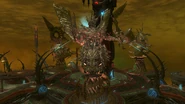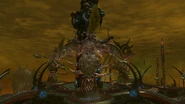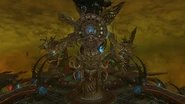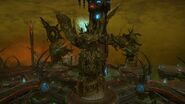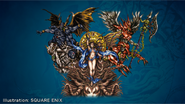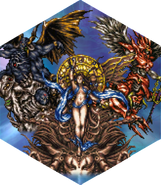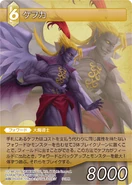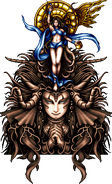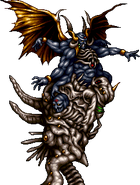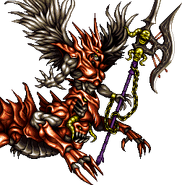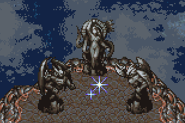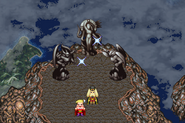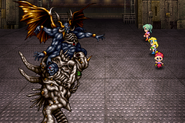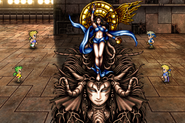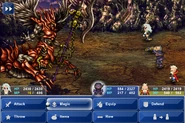Template:Sideicon
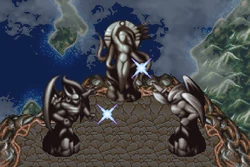
The Statues on the Floating Continent (iOS/Android/PC).
Three gods descended from the heavens. Fearing one another's power, the gods began to war. Those mortals caught amongst their fighting became espers, and were forced to fight endlessly as slaves to the gods.
Golden statues within the Esper Caves
The Warring Triad (三闘神, Santōshin?, lit. Three Warring Gods), also known as the Statues and Goddesses, are, according to legend, collectively the gods of magic and the beings that created the espers in Final Fantasy VI. They are named Demon, Fiend, and Goddess. Template:See Also
Story
Template:See Also
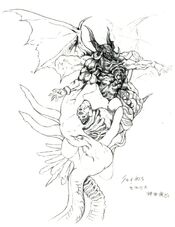
Artwork of the Fiend by Tetsuya Nomura.
Three gods descended from the heavens and fearing one another's power, began to war. The mortals caught among their fighting became espers and were forced to fight as slaves to the gods. The gods realized the chaos their fighting was causing and agreed to seal away their power. They returned the espers' free will and turned themselves to stone with the last words left for the espers being, "Never must we be woken." After the War of the Magi the espers fled the world to a new realm and took the Warring Triad's petrified remains with them. The Triad were placed in a delicate balance of power, and it was said catastrophe would occur if they were moved out of position.
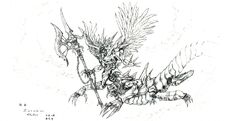
Artwork of the Demon by Tetsuya Nomura.
A thousand years later a man named Gestahl rediscovered the secrets of magic. He built up an Empire and invaded the esper world, kidnapping espers and draining their powers to be used in Magitek technology to conquer the world. Kefka Palazzo knows of the Warring Triad and plans to reawaken them. After discovering magicite, the true power of the espers, Gestahl invades the espers' world with Kefka, raising the Floating Continent with the Warring Triad's power at his fingertips. Kefka has other ideas and demands for the Warring Triad to use their full power, with Gestahl being against it. Kefka seizes the Triad's power and uses it to murder Gestahl. Kefka moves the statues out of alignment, shifting the face of the world.
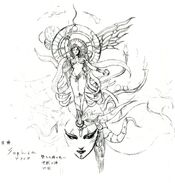
Artwork of the Goddess by Tetsuya Nomura.
Kefka uses the power of the Triad in the World of Ruin to exert his destructive will on any city that resists him, using a ray of energy called the "Light of Judgment" to burn anyone who opposes him, or destroy entire towns. When the party raids Kefka's Tower they destroy the Triad to get rid of Kefka's power source. This worries Terra, who is half-esper and half-human. The Triad are the source of magic, and thus the espers' life force. If the Triad were destroyed espers would die, possibly including Terra. By this point Kefka had drained most of the Triad's power into himself and thus become the source of magic. After Kefka is defeated, Terra survives as a human without the espers' magical abilities because of her strong feelings for the children in Mobliz.
Gameplay
Template:See Also The Warring Triad are fought as bosses in Kefka's Tower.
According to the Final Fantasy III Nintendo Player's Guide, the final battle sequence against the Statue of the Gods is supposed to be a rematch of the Warring Triad; the first tier being Demon, the second tier being Goddess, and the third tier being Fiend.[1] No official material support this, however; the idea was created by Nintendo of America.
Musical themes
"Catastrophe" is the musical piece that plays when the party confronts Kefka and Gestahl before the Warring Triad, and is also used when the Floating Continent rises. During the three battles with the Warring Triad, the music used is "Battle to the Death".
Allusions
Final Fantasy IX
Template:Sideicon

Artwork of the three statues.
Three statues in the Desert Palace appear to be an allusion to the Warring Triad. The outer statues are demonic creatures titled "Promise of the Evil God" and "Truth of the Devil." The middle statue is angelic, and is named the "Illusion of the Goddess."
Final Fantasy XIII and Final Fantasy XIII-2
Template:Sideicon Template:Sideicon The Japanese name of the "Ruthless" paradigm—(撃滅の戦鬼, Warring Demons of Destruction?), consisting of a Commando, a Ravager, and a Saboteur—may be a reference to the Triad.
Final Fantasy XIV
Template:Sideicon
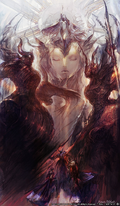
Artwork of the Warring Triad in Final Fantasy XIV: Heavensward.
The Warring Triad is a group of three primals. They had the unfortunate honor of being the first three primals that the Allagan Empire successfully bound, a technology they later used in the construction of Dalamud. They remain bound in Azys Lla, presumably inside the Flagship at the center of the floating continent. Three statues in the middle of Azys Lla are carved in their likeness, and they are otherwise identical to their appearance in Final Fantasy VI.
Archbishop Thordan travels to Azys Lla in the hopes of using the power of the trapped primals to become a god-king that would put an end to all conflict, but he is ultimately defeated by the Warrior of Light. Nevertheless, his activation of Azys Lla and his drawing upon their power begins a process of awakening, a fact not lost on Urianger. He calls upon the Warrior of Light's help in preparing for their awakening.
With each patch, the wear of the statues has increased. As of 3.15, they are covered by moss. Patch 3.2 started a Trial series based on the Warring Triad, starting with Containment Bay S1T7, followed by Containment Bay P1T6 in 3.4, and Containment Bay Z1T9 in 3.5.
Final Fantasy Dimensions II
Template:Sideicon
Dissidia Final Fantasy (2008)
Template:Sideicon Kefka's EX Burst is titled Warring Triad. The input sequence to power up the attack features three controller commands appearing over Kefka in a triangle formation in the same positioning as the Triad's statues. The circles surrounding the commands when they appear are colored in the same pattern as the Triad's color scheme: the top circle (Goddess) is blue, the left circle (Fiend) is yellow, and the right circle (Demon) is red.
Dissidia 012 Final Fantasy
Template:Sideicon Warring Triad is mentioned in the Mognet letter sent by Kathy, who tells the player of their luck for the day. Kathy describes the Warring Triad as their nemesis for always being able to keep the 'battle-relationship' "fresh."
- Your Luck Today: Bomb
Enjoy toying with an opponent's weak spot? "Warring Triad" is your nemesis, kupo! The myriad of forms it takes to appear to you will always keep the relationship fresh! Today's lucky weapon is "Fixed Dice," kupo!
Final Fantasy Trading Card Game
Template:Sideicon Kefka's Dissidia EX Mode card refers to his draining of the Triad's power with its effect. Instead of paying Kefka's cost to play him from the hand, the player may instead send three Backup or Forward cards of different elements to the Break Zone.
Gallery
Etymology and symbolism
A triad is defined as a "group of three." The number three occurs with great frequency in mythologies and religions found across the globe.
The Warring Triad may be loosely based on the Japanese gods Amaterasu, Susano'o, and Tsukuyomi. The storm god Susano'o and the moon god Tsukuyomi are male, while the sun goddess Amaterasu is female and the strongest of the three siblings. According to myth, when Izanami, one of the first gods and wife to Izanagi, died and went to the underworld, Yomi, Izanagi attempted to retrieve her but she was unable to follow. Izanagi returned to Earth and bathed to purify himself, washing out Amaterasu, Susano'o, and Tsukuyomi, from his eyes and nose. Though the three are siblings they are opposed to each other, Amaterasu and Tsukuyomi having a falling out when he killed the food goddess Uke Mochi, while Amaterasu and Susano'o were always locked in a feud.
In the original concept artwork by Tetsuya Nomura, the Warring Triad are named beyond their basic titles: the Goddess is Sophia, the Demon is Zurvan, and the Fiend is Sephiroth. The Warring Triad's primal counterparts in Final Fantasy XIV retain these names with Sephiroth's spelling changed to Sephirot to disambiguate from the Final Fantasy VII villain.
Sophia, Greek for wisdom, is a central idea in Hellenistic philosophy and religion, Platonism, Gnosticism, Orthodox Christianity, Esoteric Christianity, as well as Christian mysticism, and is commonly represented as a goddess. Sophia is also a primary deity in Gnosticism. As a feminine given name of Greek origin, Sophia retains the meaning of "wisdom", with variant names Sofia and Sophie among others in Western culture.
In Zurvanism, Zurvan is the god of infinite time (and space) and is Aka Manah ("one", "alone") deity of matter.
Səphīrōth (סְפִירוֹת, medieval Hebrew form of Sephirot; also spelled Sefirot), is a plural noun in Hebrew; the singular is Sephirah (also spelled Sefira). The Sephiroth are described in the Kabbalah as the manifestations of God that allow Him to manifest in the physical and metaphysical universes. Sephiroth also means "counting" (of numbers).
Trivia
- The triad is linked to the three principal elements. Fiend corresponds to Ice, Demon to Fire, and Goddess to Lightning.
- The Crusader esper might be the Warring Triad. In the PlayStation version bonus feature the esper section has the following description about Crusader: "This holy war between demon, devil, and goddess damages friend and foe alike". The three entities share the same titles as the ones from the Warring Triad: Demon, Fiend (devil), and Goddess. The Japanese summon name of Crusader is Jihad, a type of holy war. The "damages friend and foe alike" can refer to the Warring Triad battling each other and mortals getting caught among their fighting during the War of the Magi, and for this reason it damages both parties. In Final Fantasy Dimensions II Demon, Fiend, and Goddess's summon attacks are (天地崩壊・鬼神, Tenchi Hōkai: Kishin?, lit. Collapse of Heaven and Earth: Fierce God), (天地崩壊・魔神, Tenchi Hōkai: Majin?, lit. Collapse of Heaven and Earth: Demon God), and (天地崩壊・女神, Tenchi Hōkai: Megami?, lit. Collapse of Heaven and Earth: Goddess) respectively, which is the same as Crusader's special attack. Similar to Crusader; Demon, Fiend, and Goddess will attack all enemies and allies. In addition, the Goddess's artwork on her summon stone is posed similar to the goddess figure of the Crusader esper.
References
- ↑ Final Fantasy III Nintendo Player's Guide, p.129
Template:Limit Breaks


